Perceptions of Iraq War Starting to Shift?
Michael Barone argues that a major op-ed last week by Michael O’Hanlon and Ken Pollack, which argued that there are signs that the Surge is working, has “shake[n] up Washington and change[d] the way [the Iraq War] is viewed.” That would be astounding, indeed, given how few people read NYT op-eds, that the piece was widely an almost uniformly lampooned, and that even O’Hanlon and Pollack concede that the progress is only on the military side with nary a glimmer of hope on the much more important political-diplomatic side, which features an Iraqi government taking a month-long vacation for no apparent reason.
Interestingly, Barone argues zero evidence for his assertion. Indeed, a quick check of the polls linked by RealClear Politics (which hosts Barone’s column) shows virtually no movement on Iraq.
Newsweek (August 3):
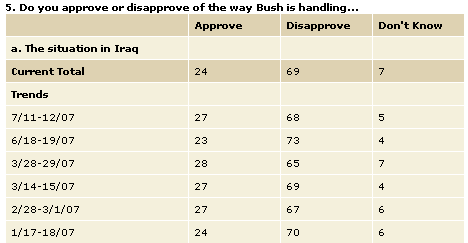
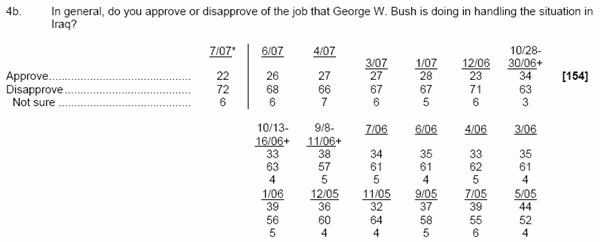
Pew:
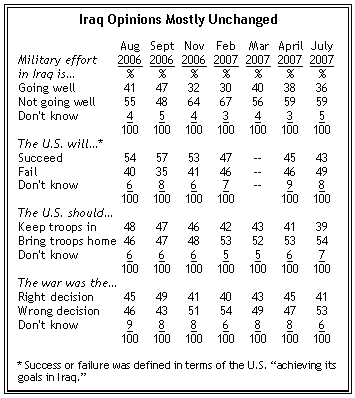
FOX doesn’t have an Iraq question but presidential approval is a somewhat reasonable proxy:
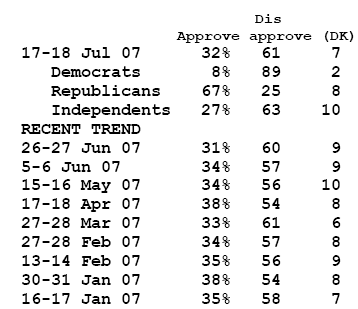
Hotline offers no trend analysis.
The only survey linked which shows significant positive movement is the Rasmussen poll, and even that is only on the Surge-specific question:
55% of likely voters want U.S. combat troops out or Iraq early in 2008. Thirty-four percent (34%) are opposed to that approach while 11% are not sure. That’s little changed from a month ago. Seventy-seven percent (77%) of Democrats want the troops to leave Iraq. That view is shared by 35% of Republicans and 49% of those not affiliated with either major political party.
[…]
Twenty-five percent (25%) of voters now say the troop surge is working and another 26% say it’s too soon to tell. A month ago, just 19% considered the surge a success and 24% said it was too early to tell. Combining those totals means that 51% are at least willing to give the policy more time. That’s up from 43% a month ago.
My fervent hope is that Barone is right that “instead of accepting defeat and inviting chaos, we may be able to achieve a significant measure of success” and that the public will rally if there are legitimate signs of progress. He’s almost certainly right that the vast majority of the country “wants victory.” But his argument that a widely debunked criticized op-ed has rallied public opinion is sheer fantasy.
UPDATE: Ace points to a second poll, one from CNN/Gallup, that points in Barone’s direction.
[T]he proportion of those who said the additional troops are “making the situation better” rose to 31% from 22% a month ago. Those who said it was “not making much difference” dropped to 41% from 51%.
Now, whether that 31% thinks “better” is good enough is unknowable. Still, interesting that two reputable polls are showing a shift. Time will tell, I suppose.




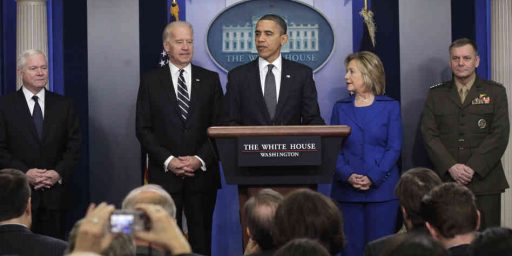
My fervent hope is that Barone is right that “instead of accepting defeat and inviting chaos, we may be able to achieve a significant measure of success†and that the public will rally if there are legitimate signs of progress.
I don’t see how we’re “inviting defeat” by recognizing the facts on the ground and understanding that our stated goal of using military force to establish a stable Iraqi democracy is wishful thinking at this point.
Is debunked the right word here?
Fair point. Correction made.
He said “accepting defeat and inviting chaos.” That strikes me as reasonable enough.
It would be, if that on that hadn’t generated so much traffic online. The fact of the matter is that even those who lampooned it, took it seriously on the idea that if even they, who have for so long denied all indications of progress, were ready to admit there was progress being made, there must be something to it.
Even in most of the rabid reaction of the usual leftist suspects , was the tacit admission that senator Reid and company were not telling us the whole story.
It should also be pointed out that there were a number of articles basically backing the point that there was progress in Iraq. Even the ones who didn’t directly refer to the peice of Pollock and O’Hanion.
an example would be the interview with John Burns , that Hewitt did.
And of course, Keith Ellison and his comments, were right in line with that momentum.
And finally, the comments of James Clyburn is stating flatly that success in Iraq was a problem for democrats, I think, was the last straw for anyone who saw them.
I do not think the operate in the New York Times changed all of the single-handedly, indeed these all popped up simultaneously. More or less, anyway.
I am shocked, shocked, that a right wing war supporter is making something up without any evidence. Surely this is a first. The surge is a great success!
Bit,
They (O’Hanlon and Pollack) have been consistent supporters of the war and the surge. The “even they” argument is more than a little disingenuous.
Care to provide evidence for that assertion?
Can you cite any outside of the rightwing blogosphere and rightwing opinion media?
John Burns gave a very mixed report, which I suppose is better than an entirely negative report.
Way to misrepresent his statements. Did you think no one would actually look up what he actually said?
He said that if Petraeus and Crocker presented a strongly positive progress report in September and the Democratic Leadership still pushed for a timetable,
The likelyhood of a strongly positive progress report from Crocker and Petreaus in September is somewhere between slim and none. All indications are that the report will be mixed at best. If there was an honest and strongly positive progress report showing that this strategy was likely to work (a mighty big if) the Dem leadership is capable of taking the pulse of its membership and its constituency and acting accordingly.